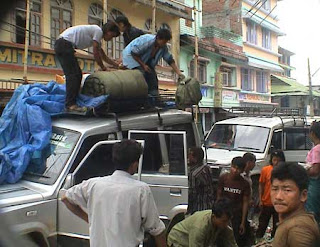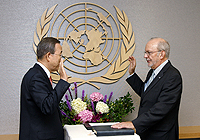 पुरनप्रसाद विष्ट- भारतको पूर्वोत्तर मेघालयका आदिवासी (खसिया, गारो, जयन्तीय) ले नेपाली भाषीविरुद्ध चलाएको दंगामा दुई दर्जन बेसीको ज्यान गइसकेको छ। निर्मम साम्प्रदायिक दंगामा मारिएकामध्ये १७ जना नेपाली भाषी छन्। अब डर अरू दंगा भड्केला भन्ने हो। केही दिनसम्म होइन, केही वर्षसम्मै।
पुरनप्रसाद विष्ट- भारतको पूर्वोत्तर मेघालयका आदिवासी (खसिया, गारो, जयन्तीय) ले नेपाली भाषीविरुद्ध चलाएको दंगामा दुई दर्जन बेसीको ज्यान गइसकेको छ। निर्मम साम्प्रदायिक दंगामा मारिएकामध्ये १७ जना नेपाली भाषी छन्। अब डर अरू दंगा भड्केला भन्ने हो। केही दिनसम्म होइन, केही वर्षसम्मै।
सन् १९८७ मा यस्तै भएको थियो। त्यस बेलाका दंगापीडित उक्त घाउबाट अझै मुक्त भइसकेका छैनन्। त्यतिखेर पनि सयौं नेपालीभाषी बेपत्ता पारिए। उनीहरूले दंगामा ज्यान गुमाएका हुन् भन्ने राज्य सरकारले कहिल्यै स्वीकार गरेन।
बेपत्ता पारिएका अधिकांश मानिस गाईवस्तुका चरन खोज्दै एकबाट अर्को ठाउँ बसाइँ सर्थे। तिनले आफ्ना परिचय वा भारतीय राष्ट्रियता प्रमाणित गर्ने कुनै कागजपत्र पाएनन्, किनभने उनीहरू निरक्षर थिए। जहिल्यै एक ठाउँबाट अर्को ठाउँ डुलिरहन्थे। स्थानीय गाउँबुढा (मुखिया) का दयामा बाँचिरहेका थिए।
१९८७ को दंगाभन्दा फरक, यसपालि यो घटनाले सञ्चारमाध्यमको ध्यान खिँचेको छ। यसो हुनुको कारण उत्तरपूर्वी दुई राज्य आसाम र मेघालयबीचको 'सीमा' विवाद हो। विगतमा अहिलेजस्तै निर्मम घटना धेरै भए, जुन कहिल्यै प्रकाशित/प्रसारित भएनन्। अबोध बालबालिका, निर्दोष महिला र असहाय वृद्धवृद्धाले ज्यान गुमाएका ती घटनाबारे स्वतन्त्र छानबीन कहिल्यै भएन, गर्न दिइएन।
लिङपी त्यस्ता दर्जन विवादित सीमा क्षेत्रमध्ये पर्छ, जसलाई आसाम र मेघालय दुवैले 'दाबी-प्रतिदाबी' गर्दै आएका छन्। मेघालयले यो क्षेत्र आफ्नो पश्चिम खासी हिलअन्तर्गत पर्ने दाबी गर्दै आएको छ। आसामले पनि आफ्नो कामरुप जिल्लाको क्षेत्राधिकारमा पर्ने अडान छाडेको छैन।
लिङपीमा पुस्तौंदेखि नेपाली भाषीको बाहुल्य छ। गत जुलाईमा अर्द्धसैनिक खासी संगठन 'सिञ्जुक कि राङबाह सनोङ अफ लिङपी एरिया'ले लिङपी र आसपास गाउँमा बसोबास गर्दै आएका नेपाली भाषीलाई 'लिङपी छोड' सूचना जारी गरेको थियो। २००९ जुलाइ २१ को सिलोङ टाइम्स अखबारमा प्रकाशित उक्त सूचनामा 'नेपाली भाषीलाई लिङपी सदाका निम्ति छाड्न १५ दिनको पर्याप्त समय दिइएको' उल्लेख छ। सूचनामा संगठनका अध्यक्ष टि नोङलाङले १५ दिनभित्र नछोडे 'बल प्रयोग गर्न नहिच्किचाउने' चेतावनी दिएका थिए।
खासीको धम्कीपछि नेपाली भाषीमाथि कुनै अप्रिय घटना हुन नदिन आसाम राज्य सरकारलाई त्यस क्षेत्रमा प्रहरी परिचालन गर्न उक्सायो। यसबाट स्थानीय आदिवासी लडाकु समूहका निसाना नेपाली रहेको प्रष्टै हुन्छ।
आसाम र मेघालय दुवै राज्य सरकार सम्भावित जातीय द्वन्द्वप्रति जानकार थिए। मेघालय सरकारले विगतमा पनि आफ्नो अर्धसैन्य दस्ता नेपाली भाषी लखेट्न प्रयोग गरेको थियो। राज्यबाट नेपालीलाई बलपूर्वक धपाइएका पर्याप्त उदाहरण छन्।
मेघालयमा १८२४ देखि नै नेपाली बस्न थालेका हुन्। जतिबेला 'ब्रिटिस इन्डिया'को गोर्खा सैनिक उत्तरपूर्वी क्षेत्रमा आफ्नो किल्ला स्थापना गर्न गएको थियो। सुरुमा ब्रिटिस इन्डियाले चेरापुञ्जीमा गोर्खा क्याम्प राख्न चाहेको हो। त्यहाँ अधिक वर्षा हुने भएकाले सिलोङमा क्यम्प राख्ने निधो गरियो, जुन पछि उत्तरपूर्वी भारतको राजधानी बन्यो।
मेघालयमा १८७८ मा गोर्खा पाठशाला खुल्यो। जुन आदिवासीहरूका सामुन्ने नेपाली भाषीको गौरव र सानको स्तम्भ बनेको छ। १९६० सम्म सिलोङमा नेपाली भाषीको बाहुल्य रहेको त्यतिबेलाको जनमत संग्रहले पुष्टि गर्छ। तर, भारतको जग्गा हदबन्दी ऐनले आदिवासीबाहेक अरूलाई जग्गा किनबेच गर्न बन्देज लगाएपछि नेपाली भाषीहरू राज्यविहीन बन्न पुगे। उत्तरपूर्वी भारतमा यो ऐन आदिवासी समुदायको रक्षा गरी बाँकीलाई विस्थापित गर्ने किसिमको थियो।
जसरी गुजरातमा मुख्यमन्त्री नरेन्द्र मोदीको 'डिजाइन'मा मुस्लिमविरुद्ध दंगा भड्कियो, त्यसैगरी उत्तरपूर्वी भारत, विशेषगरी मेघालय दसकौंदेखि 'मोदीकरण'बाट गुज्रँदै आएको छ। मोदीकरण जहिल्यै मेघालय राज्य नीति बन्दै आएको छ। राजनीतिक खेलाडीले अल्पसंख्यक नेपाली भाषीविरुद्ध दसकौंदेखि खासी विद्यार्थी संघलाई हतियार बनाउँदै आएका छन्।
१९८७ मा खासी विद्यार्थी संघका अध्यक्ष बुल लिन्डोले नेपाली भाषीविरुद्ध आतंककारी अभियानको मोर्चा सम्हालेका थिए। उनैलाई दुई वर्षपछि राज्य सरकारमा कृषिमन्त्री बनाएर पुरस्कृत गरियो। त्यसै वर्ष सबभन्दा पहिला जयन्तीयाको जवाई क्षेत्रस्थित कोइला खानीमा साम्प्रदायिक दंगा भड्कियो। राज्यसमर्थक राजनीतिज्ञ र विद्यार्थी नेताले नेपाली बस्तीमा आक्रमण गरे। सिलोङमा गोर्खा हाइस्कुल जलाइयो। अन्य नेपाली बस्तीमा पनि आक्रमण भयो। एक साताभित्रै ३५ हजारभन्दा बढी नेपाली भाषी लखेटिए। नेपाली भाषी हुनुकै 'अपराधस्वरुप' राज्य सरकारले दर्जनौं सरकारी कर्मचारीको जागिर खोस्यो।
मेघालयमा केही दसकदेखि राजनीतिक लाभका लागि 'विदेशी मूलको' ट्याग लगाउनु राज्य-संरक्षित साम्प्रदायिक हिंसाको प्रमुख हतियार बन्दै आएको छ। विगतमा निर्दोष नेपाली भाषीको नरसंहार छानबीन गर्न न राज्य सरकारले कुनै कष्ट उठायो, न दिल्लीले चासो देखायो। उल्टै केही राज्यले सदियौंदेखि बस्दै आएका नेपाली भाषीको अधिकार कटौती गर्ने कानुन बनाए। जग्गा हदबन्दी ऐन, सूचीकृत आदिवासी आरक्षण ऐन, आन्तरिक आवागमन परिचयपत्र लगायत कानुनले उत्तरपूर्वी भारतका नेपाली बस्तीलाई विस्थापित गर्न थाल्यो। ६० को दसकदेखि यो क्रम जारी छ।
यी कानुनले नेपालीविरोधी भावनालाई मलजल गरेको छ। नेपाली भाषी कडा परिश्रम, कृषि, पशुपालन र अन्य व्यावसायिक क्षेत्रमा निपूर्ण कहलिएका छन्। अर्धलडाकु ती आदिवासीलाई आधुनिक बसाइ, रहनसहन र खानपिनको सभ्या सिकाएकै नेपालीले हो। अब मेघालयमा उनीहरूकै भविष्य झनै अनिश्चित बनेको छ।
पुस्तौंदेखि पसिना सिँचित गरेर उर्वर बनाएको भूमिमा नेपालीको बाँच्ने अधिकारका लागि आवाज उठाइदिने कोही छैन। न राज्य वा दिल्लीलाई यसको हेक्का छ। दुई सताब्दीदेखि थातथलो बनाउँदै आएका असहाय नेपालीको जीवन रक्षाका लागि अब नेपालले दिल्लीलाई सचेत गराउनुको विकल्प छैन।
आखिर, उनीहरू नेपाली 'डायस्पोरा' नै हुन्।










